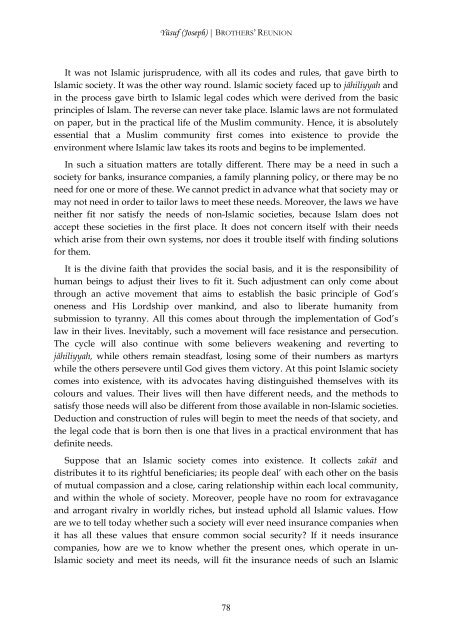Volume 10 Surah 12 - 15 - Enjoy Islam
Volume 10 Surah 12 - 15 - Enjoy Islam
Volume 10 Surah 12 - 15 - Enjoy Islam
Create successful ePaper yourself
Turn your PDF publications into a flip-book with our unique Google optimized e-Paper software.
Yūsuf (Joseph) | BROTHERS’ REUNION<br />
It was not <strong>Islam</strong>ic jurisprudence, with all its codes and rules, that gave birth to<br />
<strong>Islam</strong>ic society. It was the other way round. <strong>Islam</strong>ic society faced up to jāhiliyyah and<br />
in the process gave birth to <strong>Islam</strong>ic legal codes which were derived from the basic<br />
principles of <strong>Islam</strong>. The reverse can never take place. <strong>Islam</strong>ic laws are not formulated<br />
on paper, but in the practical life of the Muslim community. Hence, it is absolutely<br />
essential that a Muslim community first comes into existence to provide the<br />
environment where <strong>Islam</strong>ic law takes its roots and begins to be implemented.<br />
In such a situation matters are totally different. There may be a need in such a<br />
society for banks, insurance companies, a family planning policy, or there may be no<br />
need for one or more of these. We cannot predict in advance what that society may or<br />
may not need in order to tailor laws to meet these needs. Moreover, the laws we have<br />
neither fit nor satisfy the needs of non-<strong>Islam</strong>ic societies, because <strong>Islam</strong> does not<br />
accept these societies in the first place. It does not concern itself with their needs<br />
which arise from their own systems, nor does it trouble itself with finding solutions<br />
for them.<br />
It is the divine faith that provides the social basis, and it is the responsibility of<br />
human beings to adjust their lives to fit it. Such adjustment can only come about<br />
through an active movement that aims to establish the basic principle of God’s<br />
oneness and His Lordship over mankind, and also to liberate humanity from<br />
submission to tyranny. All this comes about through the implementation of God’s<br />
law in their lives. Inevitably, such a movement will face resistance and persecution.<br />
The cycle will also continue with some believers weakening and reverting to<br />
jāhiliyyah, while others remain steadfast, losing some of their numbers as martyrs<br />
while the others persevere until God gives them victory. At this point <strong>Islam</strong>ic society<br />
comes into existence, with its advocates having distinguished themselves with its<br />
colours and values. Their lives will then have different needs, and the methods to<br />
satisfy those needs will also be different from those available in non-<strong>Islam</strong>ic societies.<br />
Deduction and construction of rules will begin to meet the needs of that society, and<br />
the legal code that is born then is one that lives in a practical environment that has<br />
definite needs.<br />
Suppose that an <strong>Islam</strong>ic society comes into existence. It collects zakāt and<br />
distributes it to its rightful beneficiaries; its people deal’ with each other on the basis<br />
of mutual compassion and a close, caring relationship within each local community,<br />
and within the whole of society. Moreover, people have no room for extravagance<br />
and arrogant rivalry in worldly riches, but instead uphold all <strong>Islam</strong>ic values. How<br />
are we to tell today whether such a society will ever need insurance companies when<br />
it has all these values that ensure common social security? If it needs insurance<br />
companies, how are we to know whether the present ones, which operate in un-<br />
<strong>Islam</strong>ic society and meet its needs, will fit the insurance needs of such an <strong>Islam</strong>ic<br />
78

















